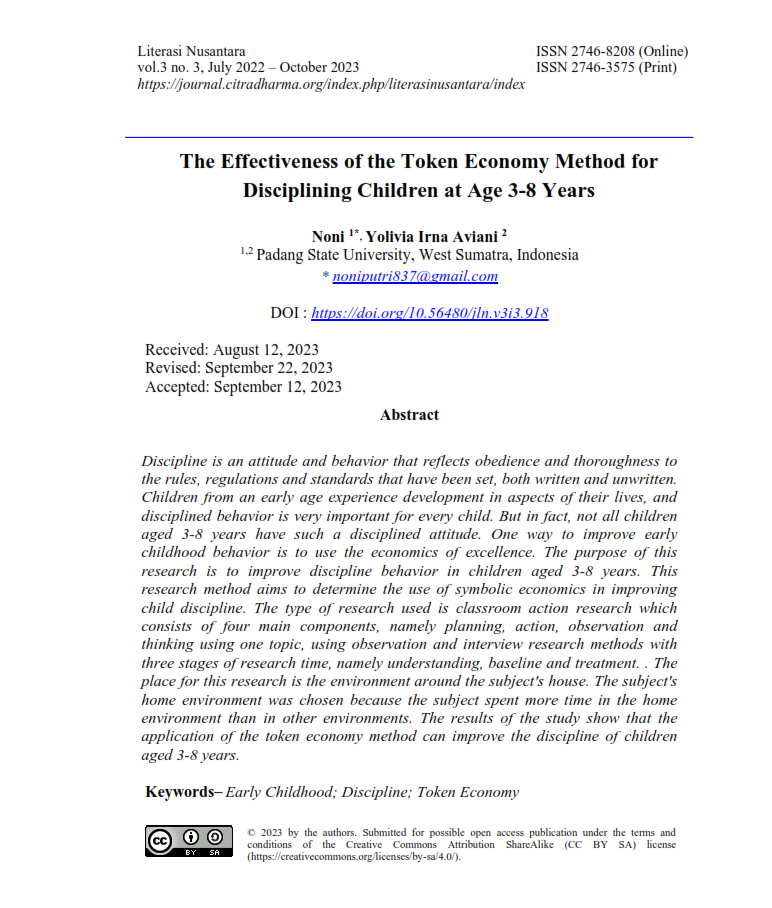The Effectiveness of the Token Economy Method for Disciplining Children at Age 3-8 Years
DOI:
https://doi.org/10.56480/jln.v3i3.918Keywords:
Early Childhood, Discipline, Token EconomyAbstract
Discipline is an attitude and behavior that reflects obedience and thoroughness to the rules, regulations and standards that have been set, both written and unwritten. Children from an early age experience development in aspects of their lives, and disciplined behavior is very important for every child. But in fact, not all children aged 3-8 years have such a disciplined attitude. One way to improve early childhood behavior is to use the economics of excellence. The purpose of this research is to improve discipline behavior in children aged 3-8 years. This research method aims to determine the use of symbolic economics in improving child discipline. The type of research used is classroom action research which consists of four main components, namely planning, action, observation and thinking using one topic, using observation and interview research methods with three stages of research time, namely understanding, baseline and treatment. . The place for this research is the environment around the subject's house. The subject's home environment was chosen because the subject spent more time in the home environment than in other environments. The results of the study show that the application of the token economy method can improve the discipline of children aged 3-8 years.
References
Abdul Majid. Http://Avinnstaff.Ugm.Ac.Id/Data/Jurnal/. Disiplin Kerja.
Aulina, C. N. (2013). Penanaman disiplin pada anak usia dini.
Conny Setiawan. (2009). Penerapan Pembelajaran Bagi Anak, (Bandung: Pt Indeks ), h.94
Dania, F. (2017). Peningkatan Kedisiplinan Anak Melalui Token Economy Di Kelompok B TK ABA DEKSO. Pendidikan Guru PAUD S-1, 6(7), 638-646.
Dian Ibung. (2009). Mengembangkan Nilai Moral pada Anak. Jakarta: PT. Elex Media Komputindo. Erlangga
Fadlillah, M. & Khoirida, L.M. (2013). Pendidikan Karakter Anak Usia Dini.
Garry Martin & Joseph Pear (2009: 323) Jurnal Pendidikan Ekonomi Undiksha Volume 9 No.1 Tahun: 2017
Hadi, Purwaka. (2005). ModifikasiPerilaku. Jakarta: Depdiknas
` Hasan, Maimunah. 2009. Pendidikan anak usia dini. Jogjakarta: Diva Press.
Hurlock, E. B. (1978). Perkembangan Anak Edisi Ke-6 jilid 2. Jakarta:
Joko Subagyo. 2011. Metode Penelitian Dalam Teori Dan Praktik. Jakarta: Rineka Cipta.
Macmillan, D. L. (1973). Behaviour modification in education. New York: MacMillan publishing co.inc.
Martin, Garry & Joseph Pear. (2015). Modifikasi Perilaku Makna dan Penerapannya. Yogyakarta: Pustaka Pelajar.
Moh. Shochib. (2000). Pola Asuh Orangtua Untuk Membantu Anak Mengembangkan Disiplin Diri. Jakarta: PT.Rineka Cipta
Nadar, W. (2019). Peningkatan kedisiplinan anak usia dini melalui metode pembiasaan token economy. ElementerIs: Jurnal Ilmiah Pendidikan Dasar Islam, 1(1), 1-11. PEDAGOGIA: Jurnal Pendidikan, 2(1), 36-49.
Purwanto, M.N. (2006). Ilmu pendidikan teoritis dan praktis. Bandung: Remaja Rosdakarya.
Rose Mini. (2011). Disiplin pada Anak. Jakarta: Kementerian Pendidikan Siswandi. (2009). Disiplin dan Belajar.
Soegarda Poerbakawatja, Ensiklopedi Pendidikan, (Jakarta:Gunung Agung, 2007), h.81
Sutrisno Hadi, Metodologi Research, (Yogyakarta: Yayasan Penerbit FB UGM, 2014),
Zainudin Dkk, Seluk-Beluk Pendidikan Al-Ghozali,(Jakarta: Bumi Aksara,1991), h.83

Downloads
Published
Issue
Section
Categories
License
Copyright (c) 2023 adminagus adminagus; Noni, Yolivia Irna Aviani

This work is licensed under a Creative Commons Attribution-ShareAlike 4.0 International License.
Copyright Notice
Authors who publish with this journal agree to the following terms:
- Authors retain copyright and grant the journal right of first publication with the work simultaneously licensed under a Creative Commons Attribution-ShareAlike 4.0 International License that allows others to share the work with an acknowledgment of the work's authorship and initial publication in this journal.
- Authors are able to enter into separate, additional contractual arrangements for the non-exclusive distribution of the journal's published version of the work (e.g., post it to an institutional repository or publish it in a book), with an acknowledgment of its initial publication in this journal.
- Authors are permitted and encouraged to post their work online (e.g., in institutional repositories or on their website) prior to and during the submission process, as it can lead to productive exchanges, as well as earlier and greater citation of published work (See The Effect of Open Access).

This work is licensed under a Creative Commons Attribution-ShareAlike 4.0 International License.



















